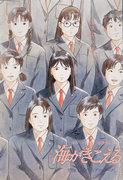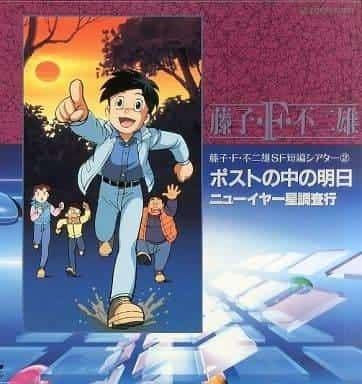The emotion and reviews of "Ocean Waves": Reassessing a Studio Ghibli masterpiece

"Ocean Waves": A mix of youthful brilliance and nostalgia■Overview of the work"Ocean Waves" is a TV special animation produced by Studio Ghibli that aired on Nippon Television in 1993. It is based on the novel of the same name by Himuro Saeko, and was directed by Mochizuki Tomomitsu and animation director Kondo Katsuya. This was Studio Ghibli's first TV special, and it also attracted attention for not being involved with Hayao Miyazaki or Isao Takahata. The broadcast time is 72 minutes, and it consists of 3 episodes. ■ StoryTaku Morisaki, who has entered a university in Tokyo, returns to his hometown of Kochi for his class reunion during his first summer vacation. On the way there, Taku remembers Muto Rikako, who transferred to his school from Tokyo out of season, and reflects on her existence. Rikako is a beautiful girl who moved to her mother's hometown of Kochi in August of her second year of high school. She is a perfect character, with beautiful looks, excellent academics, and an all-around athlete. Through his encounters and interactions with Rikako, Taku feels the brilliance of youth and nostalgia. ■Character IntroductionRikako MutoRikako is a girl who moved from Tokyo to her mother's hometown of Kochi in August of her second year of high school. She is a perfect character with three qualities: beautiful appearance, excellent academics, and all-around athletic ability, and is highly regarded by those around her. Her arrival greatly changes Taku's daily life. When Rikako is reassigned to a new class, she becomes friends with Kohama Hiromi, and the friendship between them is also depicted. Taku MorisakiTaku is the protagonist, who attends a prestigious private school in Kochi that provides a combined junior and senior high school education. Although he is an honor student, he is by no means a stickler for integrity, and has a rebellious spirit that allows him to assert his own opinions. Through his encounter with Rikako, he looks back on his youth and is depicted as growing up. Taku's best friend, Yutaka Matsuno, also plays an important part in his youth. Yutaka MatsunoYutaka Matsuno is Taku's best friend and secretly has a crush on Rikako. His presence plays an important role in further depicting the relationship between Taku and Rikako. Yutaka's pure love symbolizes the bittersweetness of youth. Hiromi ObamaHiromi Obama is Rikako's friend, and they become close after they end up sitting next to each other when classes are reshuffled. Her presence is important in portraying Rikako's relationships more realistically. Her relationship with Tadashi Yamao, who has feelings for Hiromi, is also depicted. Tadashi YamaoYamao Tadashi is a boy who has a crush on Obama Hiromi, and his nickname is Asashio. His presence plays an important role in depicting the love affairs of youth. Tadashi's pure love enhances the youthful feel of the entire work. Akiko ShimizuAkiko Shimizu is Taku's classmate and a typical class representative type girl. Her presence is important to portray Taku's school life more realistically. Akiko's seriousness and sense of responsibility symbolize the brilliance of youth. ■Production background and staff"Ocean Waves" was based on a novel by Saeko Himuro. It was directed by Tomomitsu Mochizuki, with Katsuya Kondo as animation director, Kaori Nakamura as scriptwriter, Naoya Tanaka as art director, and Atsushi Okui as director of photography. It was Studio Ghibli's first TV special, and it also attracted attention for not being involved with Hayao Miyazaki or Isao Takahata. The film was praised as a new challenge for Studio Ghibli. ■CastThe cast of this work is Yoko Sakamoto as Muto Rikako, Nobuo Tobita as Taku Morizaki, Toshihiko Seki as Yutaka Matsuno, Kae Araki as Hiromi Obama, Hikaru Midorikawa as Tadashi Yamao, and Yuri Amano as Akiko Shimizu. Each cast member's performance plays an important role in bringing out the individuality of the character. Yoko Sakamoto's performance as Rikako is especially indispensable in expressing her beauty and kindness. ■ Theme songs and musicThe theme song for this film is "Umi ni Naretara" (If I Could Become the Sea), with lyrics by Tomomitsu Mochizuki, music and arrangement by Shigeru Nagata, and vocals by Yoko Sakamoto. This song is an important piece that symbolizes the brilliance and nostalgia of Rikako and Taku's youth. Yoko Sakamoto's beautiful singing voice enhances the atmosphere of the entire film. ■ Evaluation and impressions"Ocean Waves" is a beautiful work that depicts the brilliance and nostalgia of youth. It was praised as a new challenge for Studio Ghibli and received support from many viewers. In particular, the relationship between Rikako and Taku and the scenes depicting the bittersweetness of youth captured the hearts of many viewers. Additionally, Yoko Sakamoto's beautiful singing voice and the song "If I Could Become the Sea" are also important elements that enhance the overall atmosphere of the work. This is a beautiful work that depicts the brilliance and nostalgia of youth, and is loved by many viewers. In particular, the relationship between Rikako and Taku, and the scenes that depict the bittersweetness of youth, have touched the hearts of many viewers. In addition, Yoko Sakamoto's beautiful singing voice and the song "Umi ni Naretara" are also important elements that enhance the atmosphere of the entire work. ■ Recommendation points"Ocean Waves" is a beautiful work that depicts the brilliance and nostalgia of youth. In particular, the relationship between Rikako and Taku and the scenes depicting the bittersweetness of youth have captured the hearts of many viewers. Furthermore, Sakamoto Yoko's beautiful singing voice and the song "If I Could Become the Sea" are also important elements that enhance the atmosphere of the entire work. "Ocean Waves" is a beautiful work that depicts the brilliance and nostalgia of youth and is a work that is loved by many viewers. In particular, the relationship between Rikako and Taku and the scenes depicting the bittersweetness of youth have captured the hearts of many viewers. Furthermore, Sakamoto Yoko's beautiful singing voice and the song "If I Could Become the Sea" are also important elements that enhance the atmosphere of the entire work. This is a beautiful work that depicts the brilliance and nostalgia of youth, and is loved by many viewers. In particular, the relationship between Rikako and Taku and the scenes depicting the bittersweetness of youth have captured the hearts of many viewers. Furthermore, Sakamoto Yoko's beautiful singing voice and the song "If I Could Become the Sea" are also important elements that enhance the overall atmosphere of the work. This is a beautiful work that depicts the brilliance and nostalgia of youth, and is loved by many viewers. In particular, the relationship between Rikako and Taku and the scenes depicting the bittersweetness of youth have captured the hearts of many viewers. Furthermore, Sakamoto Yoko's beautiful singing voice and the song "If I Could Become the Sea" are also important elements that enhance the overall atmosphere of the work. This is a beautiful work that depicts the brilliance and nostalgia of youth, and is loved by many viewers. In particular, the relationship between Rikako and Taku and the scenes depicting the bittersweetness of youth have captured the hearts of many viewers. Furthermore, Sakamoto Yoko's beautiful singing voice and the song "If I Could Become the Sea" are also important elements that enhance the overall atmosphere of the work. This is a beautiful work that depicts the brilliance and nostalgia of youth, and is loved by many viewers. In particular, the relationship between Rikako and Taku and the scenes depicting the bittersweetness of youth have captured the hearts of many viewers. Furthermore, Sakamoto Yoko's beautiful singing voice and the song "If I Could Become the Sea" are also important elements that enhance the overall atmosphere of the work. This is a beautiful work that depicts the brilliance and nostalgia of youth, and is loved by many viewers. In particular, the relationship between Rikako and Taku and the scenes depicting the bittersweetness of youth have captured the hearts of many viewers. Furthermore, Sakamoto Yoko's beautiful singing voice and the song "If I Could Become the Sea" are also important elements that enhance the overall atmosphere of the work. This is a beautiful work that depicts the brilliance and nostalgia of youth, and is loved by many viewers. In particular, the relationship between Rikako and Taku and the scenes depicting the bittersweetness of youth have captured the hearts of many viewers. Furthermore, Sakamoto Yoko's beautiful singing voice and the song "If I Could Become the Sea" are also important elements that enhance the overall atmosphere of the work. This is a beautiful work that depicts the brilliance and nostalgia of youth, and is loved by many viewers. In particular, the relationship between Rikako and Taku and the scenes depicting the bittersweetness of youth have captured the hearts of many viewers. Furthermore, Sakamoto Yoko's beautiful singing voice and the song "If I Could Become the Sea" are also important elements that enhance the overall atmosphere of the work. This is a beautiful work that depicts the brilliance and nostalgia of youth, and is loved by many viewers. In particular, the relationship between Rikako and Taku and the scenes depicting the bittersweetness of youth have captured the hearts of many viewers. Furthermore, Sakamoto Yoko's beautiful singing voice and the song "If I Could Become the Sea" are also important elements that enhance the overall atmosphere of the work. This is a beautiful work that depicts the brilliance and nostalgia of youth, and is loved by many viewers. In particular, the relationship between Rikako and Taku and the scenes depicting the bittersweetness of youth have captured the hearts of many viewers. Furthermore, Sakamoto Yoko's beautiful singing voice and the song "If I Could Become the Sea" are also important elements that enhance the overall atmosphere of the work. This is a beautiful work that depicts the brilliance and nostalgia of youth, and is loved by many viewers. In particular, the relationship between Rikako and Taku and the scenes depicting the bittersweetness of youth have captured the hearts of many viewers. Furthermore, Sakamoto Yoko's beautiful singing voice and the song "If I Could Become the Sea" are also important elements that enhance the overall atmosphere of the work. This is a beautiful work that depicts the brilliance and nostalgia of youth, and is loved by many viewers. In particular, the relationship between Rikako and Taku and the scenes depicting the bittersweetness of youth have captured the hearts of many viewers. Furthermore, Sakamoto Yoko's beautiful singing voice and the song "If I Could Become the Sea" are also important elements that enhance the overall atmosphere of the work. This is a beautiful work that depicts the brilliance and nostalgia of youth, and is loved by many viewers. In particular, the relationship between Rikako and Taku and the scenes depicting the bittersweetness of youth have captured the hearts of many viewers. Furthermore, Sakamoto Yoko's beautiful singing voice and the song "If I Could Become the Sea" are also important elements that enhance the overall atmosphere of the work. This is a beautiful work that depicts the brilliance and nostalgia of youth, and is loved by many viewers. In particular, the relationship between Rikako and Taku and the scenes depicting the bittersweetness of youth have captured the hearts of many viewers. Furthermore, Sakamoto Yoko's beautiful singing voice and the song "If I Could Become the Sea" are also important elements that enhance the overall atmosphere of the work. This is a beautiful work that depicts the brilliance and nostalgia of youth, and is loved by many viewers. In particular, the relationship between Rikako and Taku and the scenes depicting the bittersweetness of youth have captured the hearts of many viewers. Furthermore, Sakamoto Yoko's beautiful singing voice and the song "If I Could Become the Sea" are also important elements that enhance the overall atmosphere of the work. This is a beautiful work that depicts the brilliance and nostalgia of youth, and is loved by many viewers. In particular, the relationship between Rikako and Taku and the scenes depicting the bittersweetness of youth have captured the hearts of many viewers. Furthermore, Sakamoto Yoko's beautiful singing voice and the song "If I Could Become the Sea" are also important elements that enhance the overall atmosphere of the work. This is a beautiful work that depicts the brilliance and nostalgia of youth, and is loved by many viewers. In particular, the relationship between Rikako and Taku and the scenes depicting the bittersweetness of youth have captured the hearts of many viewers. Furthermore, Sakamoto Yoko's beautiful singing voice and the song "If I Could Become the Sea" are also important elements that enhance the overall atmosphere of the work. This is a beautiful work that depicts the brilliance and nostalgia of youth, and is loved by many viewers. In particular, the relationship between Rikako and Taku and the scenes depicting the bittersweetness of youth have captured the hearts of many viewers. Furthermore, Sakamoto Yoko's beautiful singing voice and the song "If I Could Become the Sea" are also important elements that enhance the overall atmosphere of the work. This is a beautiful work that depicts the brilliance and nostalgia of youth, and is loved by many viewers. In particular, the relationship between Rikako and Taku and the scenes depicting the bittersweetness of youth have captured the hearts of many viewers. Furthermore, Sakamoto Yoko's beautiful singing voice and the song "If I Could Become the Sea" are also important elements that enhance the overall atmosphere of the work. |
<<: Dragon League: An Unmissable Anime Experience
>>: Appeal and evaluation of "MINKY MOMO IN Bridge over Dreams": A moving story and deep characters
Recommend
Spider-Man 4 is rumored to start filming at the end of 2023 and be released in 2025
According to Spider-Man: Updates, a Spider-Man in...
The new movie version of "Mobile Police EZY" has been announced. The new trailer for the 5th anniversary will be released this summer
Compared to the "Gundam" series, which ...
Giovanni's Island: A Thorough Analysis of the Moving Story and Its Appeal
"Giovanni's Island": A moving story...
The appeal and evaluation of The New Prince of Tennis U-17 WORLD CUP: A deep look at episode 3
The appeal and evaluation of "The New Prince...
The appeal and evaluation of Hetalia The Beautiful World: A fusion of history and humor
Hetalia The Beautiful World - A fusion of humor a...
God of War and Horizon to follow The Last of Us formula
The producers of "God of War" and "...
Total box office in April 2024 exceeds 1 billion! Hayao Miyazaki wins the Oscar for Best Animation
According to Maoyan Professional Edition data, as...
The new trailer of the animation "The Hidden Labyrinth Only I Can Enter" will be broadcast on January 8, 2021
The TV animation of the popular long-titled light...
A large number of "Smurfs" gathered in France to challenge the Guinness record but unfortunately failed
The classic cartoon "The Smurfs" has lo...
New version of "Death on the Nile" Chinese trailer and poster released
The new version of "Death on the Nile",...
Review of "Momotaro of the Sea": A tale of maritime adventure and growth
"Momotaro of the Sea": A masterpiece th...
"Dororo" Review: A masterpiece anime that combines period drama and horror
Dororo - A story of demons and humans in the Warr...
"Terminator: Dark Fate" Chinese trailer Schwarzenegger T800 is still strong
The new Chinese trailer of "Terminator: Dark...
C3 -C Cube- Cube×Cursed×Curíous: A deep review of episodes not aired on TV
C3 -C Cube- Cube×Cursed×Curíous TV unaired episod...
P1S "Ghost in the Shell SAC_2045" Kusanagi Motoko 1/4 statue priced at $1599
Today, the famous model manufacturer Prime1Studio...









